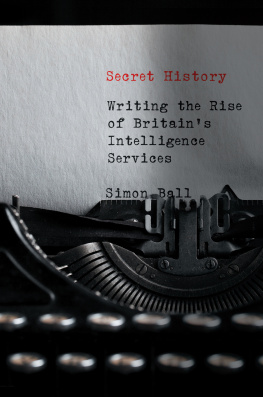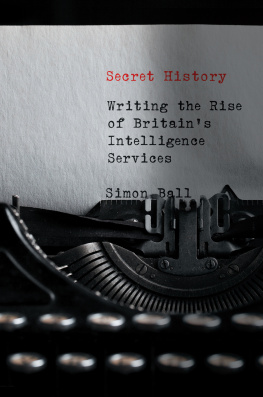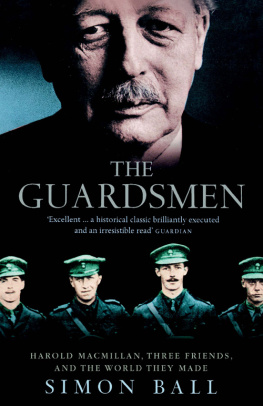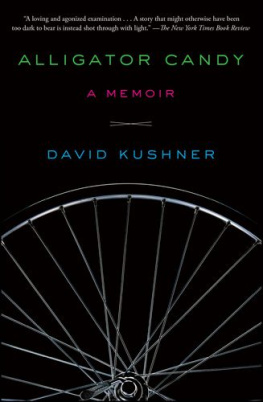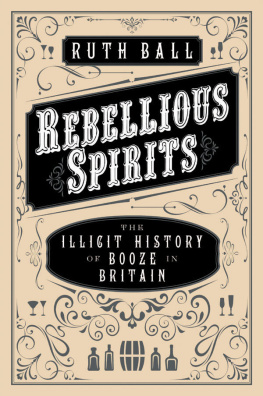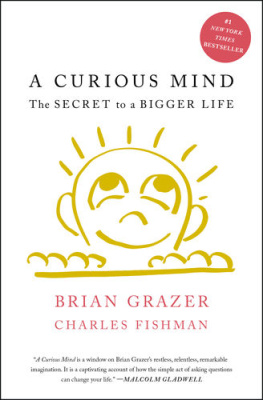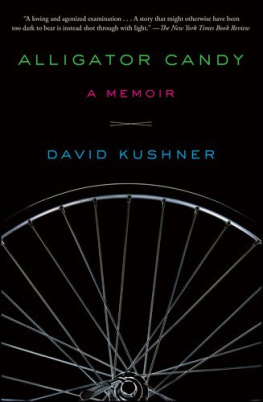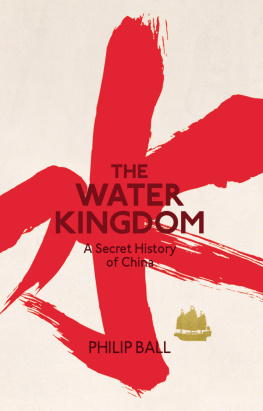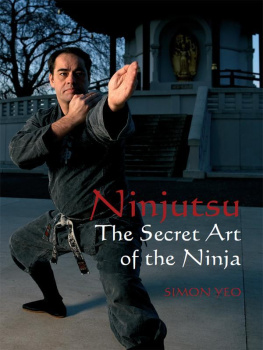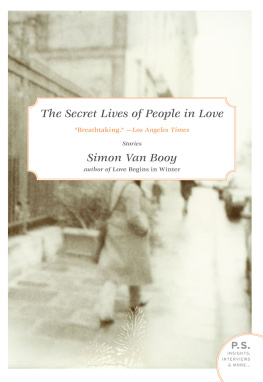Simon Ball - Secret History
Here you can read online Simon Ball - Secret History full text of the book (entire story) in english for free. Download pdf and epub, get meaning, cover and reviews about this ebook. year: 2020, genre: History. Description of the work, (preface) as well as reviews are available. Best literature library LitArk.com created for fans of good reading and offers a wide selection of genres:
Romance novel
Science fiction
Adventure
Detective
Science
History
Home and family
Prose
Art
Politics
Computer
Non-fiction
Religion
Business
Children
Humor
Choose a favorite category and find really read worthwhile books. Enjoy immersion in the world of imagination, feel the emotions of the characters or learn something new for yourself, make an fascinating discovery.
- Book:Secret History
- Author:
- Genre:
- Year:2020
- Rating:5 / 5
- Favourites:Add to favourites
- Your mark:
- 100
- 1
- 2
- 3
- 4
- 5
Secret History: summary, description and annotation
We offer to read an annotation, description, summary or preface (depends on what the author of the book "Secret History" wrote himself). If you haven't found the necessary information about the book — write in the comments, we will try to find it.
Simon Ball: author's other books
Who wrote Secret History? Find out the surname, the name of the author of the book and a list of all author's works by series.
Secret History — read online for free the complete book (whole text) full work
Below is the text of the book, divided by pages. System saving the place of the last page read, allows you to conveniently read the book "Secret History" online for free, without having to search again every time where you left off. Put a bookmark, and you can go to the page where you finished reading at any time.
Font size:
Interval:
Bookmark:

SECRET HISTORY
SECRET HISTORY
Writing the Rise
of Britains
Intelligence Services
SIMON BALL
McGill-Queens University Press
Montreal & Kingston London Chicago
McGill-Queens University Press 2020
ISBN 978-0-2280-0081-5 (cloth)
ISBN 978-0-2280-0082-2 (paper)
ISBN 978-0-2280-0220-8 (ePDF)
ISBN 978-0-2280-0221-5 (ePUB)
Legal deposit second quarter 2020
Bibliothque nationale du Qubec
Printed in Canada on acid-free paper that is 100% ancient forest free
(100% post-consumer recycled), processed chlorine free

We acknowledge the support of the Canada Council for the Arts.
Nous remercions le Conseil des arts du Canada de son soutien.
Library and Archives Canada Cataloguing in Publication
Title: Secret history : writing the rise of Britains intelligence services / Simon Ball.
Names: Ball, S. J. (Simon J.), author.
Description: Includes bibliographical references and index.
Identifiers: Canadiana (print) 20190235195 | Canadiana (ebook) 20190235225 | ISBN 9780228000822 (paper) | ISBN 9780228000815 (cloth) | ISBN 9780228002208 (ePDF) | ISBN 9780228002215 (ePUB)
Subjects: LCSH: Intelligence serviceGreat BritainHistory20th century.
Classification: LCC UB251.G7 B35 2020 | DDC 327.1241dc23
To Helen
CONTENTS
1
Oh! What a Lovely War
2
Talking about a Revolution
3
The Locust Has Eaten
4
The Audit of War
5
The History Boys
6
Look Back in Anger
FIGURES
ACKNOWLEDGEMENTS
I would like to thank the institutions and people who have made Secret History possible.
The research for this book was carried out under United Kingdom Arts and Humanities Research Council (AHRC) Research Grant AH/J000175/1: Cultures of Intelligence: Military Intelligence Services in Germany, Great Britain, and the USA (Britain, 19181947). I would like to thank the AHRC, its reviewers, and its officials for this award. Secret History exists as a result of Cultures of Intelligence.
My biggest debt is owed to Alan MacLeod, the AHRC Cultures of Intelligence Research Fellow at the University of Leeds. Alans work is bound up into every page of Secret History. His intellectual influence can be felt particularly strongly in each passage concerning security or signals intelligence.
The AHRC Cultures of Intelligence was formally twinned with Gerda Henkels Stiftung, Kulturen der Intelligence: Ein Forschungsprojekt zur Geschichte der militrischen Nachrichtendientse in Deutschland, Grossbritannien und der USA, 19001947.
The origin of the twinned research project was a question that Snke Neitzel, of the University of Potsdam, and I asked each other years ago: Why were the intelligence cultures of Britain and Germany so different in the era of the two world wars? I would like to thank Snke for being my comrade-in-arms and intellectual interlocutor throughout the gestation and writing of Secret History.
I would also like to thank the other leaders of Kulturen der Intelligence, Philipp Gassert, of the University of Mannheim, and Andreas Gestrich, of the German Historical Institute, London, for being such gracious and stimulating collaborators. The German Historical Institute, under Andreass direction, served as our base of operations. The institute was a formal project partner, supporting the Cultures of Intelligence joint conference that crystallized Secret History. I am particular grateful to Carole Sterckx for being such a wonderful conference organizer.
Many of the concepts that underpin Secret History were developed during the discussion of the research of the Kulturen der Intelligence project team. It was a pleasure to work with Bernard Sassmann (Mannheim), Frederik Mllers (Potsdam), and Michael Rupp (Potsdam).
Peter Jackson gave the brilliant keynote address that launched the GHIL Cultures of Intelligence joint conference. Peter and I were, by then, also running the AHRC International Network, AH/M008711/1: The Practice of International History in the Twenty-First Century (PIH21), with the Chief Historian, Foreign and Commonwealth Office, Patrick Salmon. Inevitably, Cultures of Intelligence and PIH21 intertwine in my mind. Patrick and, his deputy Richard Smith, were a support throughout. Peter was a fantastic partner, and brought the full weight of his own research to bear on Secret History. Peter has heavily influenced Secret History, both through discussion and by generously sharing work under development.
At the University of Leeds, I have been fortunate to work with an outstandingly talented cohort of research students investigating intelligence and related fields. My thanks go to Patrick Kiernan, Matthew Lord, Alex Shaw, Luke Daly-Groves, Ben Holt, and Francesca Morphakis for indulging their supervisors enthusiasms. I am grateful to the White Rose College of Arts and Humanities (WROCAH), the AHRC doctoral training partnership of the Universities of Leeds, Sheffield, and York for awarding full PhD scholarships to Alex, Luke, Ben, and Francesca. I am equally grateful to the School of History, University of Leeds, for awarding full PhD scholarships to Patrick and Matthew.
The final-year undergraduates at the University of Leeds taking my Special Subject, Secret Service: The World of British Intelligence, tolerated my working through of ideas and evidence for Secret History in their classroom. I had a good time doing so: I hope they benefited from research-based learning in its purest form.
My colleagues at the University of Leeds have been a constant source of ideas and encouragement. Holger Afflerbach was the provider of much useful insight into the role of Walter Nicolai. Michael Brennan walked me through the intelligence contacts of Eric Ambler. I would like to thank particularly Simon Hall and Will Gould for their support when they were Head of the School of History and its Director of Research, respectively.
The schools willingness to grant me a years leave from teaching while I myself was its Director of Research has been instrumental in completing Secret History.
The Brotherton Library, University of Leeds, purchased an important digital document resource on my behalf, making writing Secret History a much more efficient process than it otherwise would have been. The School of Historys Staff Research Fund and the research support fund of the Faculty of Arts, Humanities, and Cultures for the benefit of the Professor of International History and Politics enabled the purchase of digitized documents and high-resolution images. Such support ultimately derives from the Quality-Related (QR) Research Funding provided to the University of Leeds by Research England.
I am grateful to the trustees of the Liddell Hart Centre for Military Archives, Kings College, London, for permission to quote from the diaries of Major-General F.H.N. Davidson.
I was enormously pleased when Richard Baggaley commissioned Secret History for McGill-Queens University Press. I would like to thank the presss anonymous readers for taking such care and time with my work. Their reasoned and helpful reports have greatly improved this book.
The completion of Secret History coincides with the thirtieth anniversary of my first meeting with my wife, Helen. She has been trying to improve me as an historian and a stylist ever since we were students at Cambridge.
Next pageFont size:
Interval:
Bookmark:
Similar books «Secret History»
Look at similar books to Secret History. We have selected literature similar in name and meaning in the hope of providing readers with more options to find new, interesting, not yet read works.
Discussion, reviews of the book Secret History and just readers' own opinions. Leave your comments, write what you think about the work, its meaning or the main characters. Specify what exactly you liked and what you didn't like, and why you think so.

